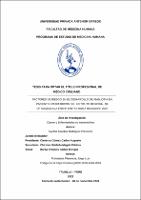Factores de riesgo en el desarrollo de Ambliopía en pacientes pediátricos del Instituto Regional de Oftalmología entre Enero 2019 a Diciembre 2020

Ver/
Descargar
(application/pdf: 694.7Kb)
(application/pdf: 694.7Kb)
Fecha
2023Autor(es)
Rodriguez Plasencia, Cynthia Carolina
Metadatos
Mostrar el registro completo del ítemResumen
Determinar los principales factores de riesgo en el desarrollo de
ambliopía en pacientes pediátricos del IRO entre enero 2019 a diciembre 2020
MATERIAL Y METODOS: Se realizó un estudio analítico, longitudinal de casos
y controles según su orientación y observaciones, evaluando 248 pacientes
atendidos en el IRO- Trujillo – La Libertad entre el enero del 2019 a diciembre
del 2020. La muestra cotejo 62 casos y 186 controles, cumpliendo con los
criterios de integración y exclusión. Recolectando los datos fue en el
departamento de Estadística, Archivo y Epidemiologia del IRO, Sistema de
Focalización de Hogares (SISFOH) y el Padrón General de Hogares (PGH), Se
usó el programa estadístico SPSS, obteniendo porcentajes y frecuencias, y un
análisis bivariado y multivariado, odds ratio, IC 95% y X2 de Pearson.
RESULTADOS: El Estrabismo era antecedente en un 40.3% de pacientes con
ambliopía con un valor de p = 0.004, Chi2 = 8.513 y OR de 2,466. La Miopía
aislada presente en 1.6%, p=0.507, La Hipermetropía aislada presente en un
8.1%, con un p= 0.031, un análisis de Chi2= 4.650 y OR= 3.99. Astigmatismo
aislado con 11.3% (p=0.014) Chi2=6.088 y OR=3.818. La Hipermetropía con
Astigmatismo en 56.5% de los casos del estudio, un p= 0.00 y un análisis de
Chi2= 22.147 y OR= 4.062. Miopía con astigmatismo con 22.6% de los casos y
un p= 0.0027 un Chi2= 4.890 y un OR=2.292, Prematuridad con 14.5% de los
pacientes con ambliopía, con p=0.690, La Condición Socio Económica, la cual
tiene tres categorías, en la “NO POBRE” 67.7%, un 24.2% para “POBRE” y un
8.1% en “EXTREMA POBREZA”, Chi2 de 1.066, un p= 0.587 y un Phi de 0.066.
CONCLUSIONES: Estrabismo, hipermetropía, astigmatismo, miopía con
astigmatismo y la hipermetropía con astigmatismo aumentan la probabilidad del
desarrollo de la enfermedad en estudio. La prematuridad y la condición socio
económica, por el contrario no se asocia con el desarrollo de la ambliopía. To determine the main risk factors in the development of amblyopia
in pediatric patients of the IRO between January 2019 and December 2020.
MATERIAL AND METHODS: An analytical, longitudinal study of cases and
controls was carried out according to their orientation and observations,
evaluating 248 patients treated at the IRO- Trujillo - La Libertad between January
2019 and December 2020. The sample compared 62 cases and 186 controls,
complying with the integration and exclusion criteria. The data was collected in
the Department of Statistics, Archives and Epidemiology of the IRO, the
Household Targeting System (SISFOH) and the General Household Register
(PGH). The statistical program SPSS was used, obtaining percentages and
frequencies, and a bivariate analysis. and multivariate, odds ratio, 95% CI and
Pearson's X2.
RESULTS: Strabismus was a history in 40.3% of patients with amblyopia with a
value of p = 0.004, Chi2=8.513 and OR of 2.466. Isolated myopia present in 1.6%,
p=0.507, isolated hyperopia present in 8.1%, with p=0.031, an analysis of Chi2=
4.650 and OR=3.99. Isolated astigmatism with 11.3% (p=0.014) Chi2=6.088 and
OR=3.818. Hyperopia with Astigmatism in 56.5% of the study cases, p=0.00 and
an analysis of Chi2= 22.147 and OR= 4.062. Myopia with astigmatism with 22.6%
of the cases and a p= 0.0027 a Chi2= 4.890 and an OR=2.292, Prematurity with
14.5% of the patients with amblyopia, with p=0.690, The Socio Economic
Condition, which has three categories, in ““NOT POOR““ 67.7%, 24.2% for
““POOR““ and 8.1% in ““EXTREME POVERTY““, Chi2 of 1.066, p= 0.587 and Phi
of 0.066.
CONCLUSIONS: Strabismus, hyperopia, astigmatism, myopia with astigmatism
and hyperopia with astigmatism increase the probability of developing the
disease under study. Prematurity and socioeconomic status, on the other hand,
are not associated with the development of amblyopia.
Palabras clave
Colecciones
- Medicina Humana [2969]

